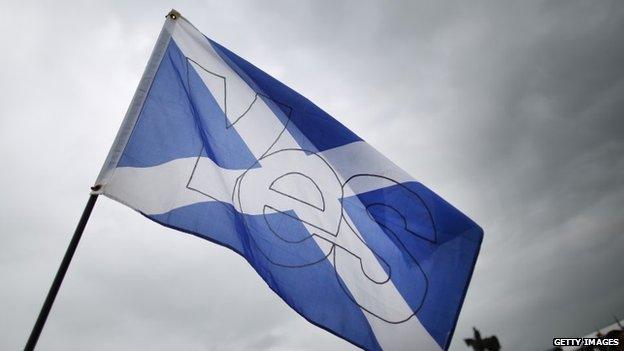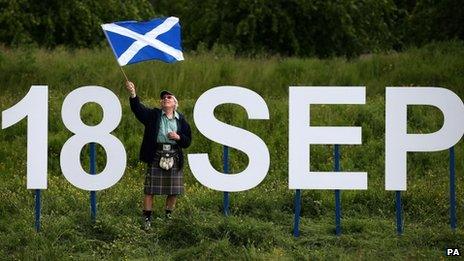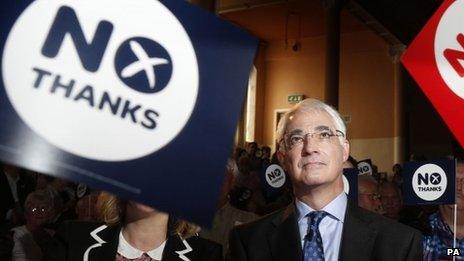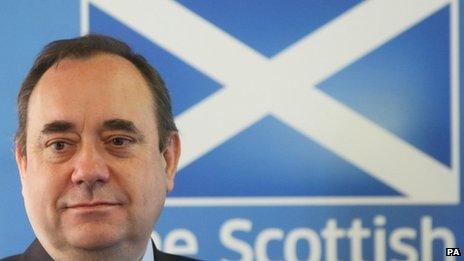Scotland, for richer or poorer?
- Published
- comments

Is there a clear economic case for Scotland either to constitute itself as an independent nation or remain part of the UK?
That is what I have been trying find out, for a documentary you can see on Monday, 7 July on BBC2 at 9pm ("Scotland: for Richer or Poorer)
It has been a bit of an adventure, during which I was turned upside down underwater in a dummy helicopter as part of an offshore safety training course, I communed with Desperate Dan in Dundee and I opened the Shetland Folk Festival (one of the great thrills of my life).
My affection for Scotland was significantly reinforced, not that it was nugatory before. I may not be Scottish, but important parts of my late wife's family are; and, to make no bones about it, it is always a joy to be there.
As it happens, Scotland has been pretty important to me in a professional sense, especially after I broadcast and published a series of scoops in 2008 and 2009 about the unholy mess brought upon themselves by two very big Scottish banks, RBS and HBOS.
Which is why it has been a matter of some importance to me to find out whether there may be a decisive money-based argument for Scotland going it alone or for the status quo.
Is it unambiguously clear that Scotland would be more or less prosperous as an independent nation?
North sea oil
Now I hope I don't stop you reading, or watching the film, by conceding at the outset that this question cannot be answered with certainty.
There are many reasons for this, but two stand out for me.
First is that North Sea oil and gas will remain a substantial part of the Scottish economy for decades, and it is impossible to forecast with a high degree of confidence either the rate at which exploitable hydrocarbon reserves will be depleted - because technology has a habit of finding better ways of extracting the stuff - or the future price of energy.
For what it is worth, the Westminster government's official forecasting body, the Office for Budget Responsibility, believes North Sea oil revenues - including the tax take - will fall significantly faster than Alex Salmond and the pro-independence campaign believe.
Second - and some may see this as incongruous - much of what will determine the near-term wealth and income of Scotland will not be negotiated or decided until after the Scottish people vote not to be governed by Westminster.
These imponderables would include:
a) Scotland's future share of the UK's national debt,
b) what interest rate a Scottish government would pay on that debt and any other debt it accumulates;
c) Scotland's share of UK assets, including oil and gas reserves and the Bank of England's gold;
d) Scotland's currency and monetary arrangements.

The referendum takes place on 18 September
Or to put it another way, residents of Scotland are being asked to make arguably the most momentous constitutional decision in their history in the absence of some material financial information - which would ultimately be decided in talks between Westminster and Edinburgh, and by markets.
Scotland is on the market, as it were, without a comprehensive and reliable prospectus about its expected future income and what it's worth: which makes it challenging for those living in Scotland to decide whether to be a buyer or a seller of Scottish independence.
That said, my peregrinations north of the border have not been utterly fruitless.
I came to four broad conclusions.
First, Scotland may be a bit poorer in the early years after independence, although not devastatingly so.
There are, for example, the one-off expenses of taking administrative responsibility for activities that currently fall to Westminster and London (as ever, the magnitude of these is disputed).
Also, Scotland will in the coming few years suffer a bigger gap between what it spends and what it receives in tax revenues than the UK as a whole - according to the respected Institute for Fiscal Studies (all other things being equal, to use the weasel words so loved by economists).
Interest rates
This gap or deficit would either be more than three percentage points bigger by 2018-19 or about 1.3 percentage points bigger, depending on whether taxation of North Sea oil was in line either with the less optimistic forecasts of the OBR or the more optimistic scenarios of the Scottish government.
Then there are the related questions of what currency Scotland would adopt and what interest rate it would pay to borrow.
There are various permutations here - the pound on a formally agreed basis with Westminster, the pound with no influence over interest rates or the Bank of England, a new currency or the euro - each with their own direct costs, advantages and risks.
However it turned out, on almost all scenarios the Scottish government would pay a modestly higher rate of interest on its debts than the Westminster government - because it is a relatively small economy, it might not have its own central bank able to create money out of thin air to repay debts, and it would not have a track record as a borrower.
That said, the interest-rate increment would not be massive.
This is what Mike Amey of Pimco - the world's biggest investor in government bonds and therefore the world's biggest lender to governments - told me:
"Our best estimate, assuming a reasonably even split of assets and liabilities, would be the interest rate [paid by the Scottish government] would be between ½% and 1% more than the UK government currently pays."

Alistair Darling is leading the Better Together campaign
Mr Amey says this higher borrowing cost would reduce Scotland's national income by up to 1%. Which would be meaningful, but by no means prohibitive.
So perhaps the biggest questions are whether the entrepreneurial and wealth-creating skills of the Scots would be unleashed by self-determination - and whether the government of a smaller country would respond more nimbly and effectively to the needs of business.
Jim Ratcliffe, the immensely wealthy owner of oil refineries and chemical plants all over the world - whose Ineos business owns the vast Grangemouth plant on the Firth of Forth - said: "I'm not a believer necessarily in big is beautiful. I think small can work; it can be very, very focused, it can be very energetic, it can be nimble and it can be extremely effective.
"And you can take Switzerland as a, as a very good example of that, it's an extremely successful economy, it's one of the highest GDPs per capita."
I then asked Mr Ratcliffe if it was easier to get hold of George Osborne and David Cameron or Alex Salmond.
This is what he replied: "It's much easier to talk to Alex Salmond, than it is to George Osborne or David Cameron."
Union
So although Mr Ratcliffe did not say how he would vote, he was very clear that it would not materially harm his business.
Even a passionate supporter of the union between Scotland and the rest of the UK, the Scottish chairman of the UK's biggest bank HSBC, Douglas Flint - who told me separation of Scotland would be "a tragedy" - is not arguing that Scotland would be a basket case as a separate nation.

First Minister Alex Salmond says an independent Scotland would be one of the world's richest countries.
Mr Flint's point is this: "Scotland's a rich country, there's no doubt of that but I think it's richer as part of the United Kingdom. And I think to some extent, you are swapping the certainty of 300-odd years of history where the two economies have grown together and become integrated for a vision of the future which is well articulated, but is only a vision of the future and is uncertain."
And of course there are plenty of business people who are very excited at the wealth-creating energy they believe will be created by independence.
This is what Tony Banks, a care homes entrepreneur said: "To me as an entrepreneur, independence makes total sense: to have control and be in charge of our own destinies and to be able to shape the future, shape the policies and shape the way the nation's going to turn out. I see independence as a business opportunity of a lifetime."
The fundamental point is that Scottish people have to weigh up the probable short-term costs of independence against the possible long-term rewards.
Or do they?
Because my main conclusion from my investigations is that if I had a vote, I would not be casting it purely on the basis of the economics - because it does not seem to me that the amounts of income and wealth at stake are life-changingly huge: Scotland, certainly in the longer term, is likely to be a relatively rich and successful economy on either road.
What matters far more, arguably, is how Scots see themselves in a much broader sense, either as a confident nation that is proud of being part of a bigger country, the United Kingdom, or as a people stifled and limited by the historic union.
So have I wasted my time by looking at whether an independent Scotland would be richer or poorer?
Actually I don't think so - because the economic arguments certainly matter, and in a way it is reassuring that a question about self-determination and identity can be decided by Scots largely pondering who they are, rather than how rich they may or may not become.